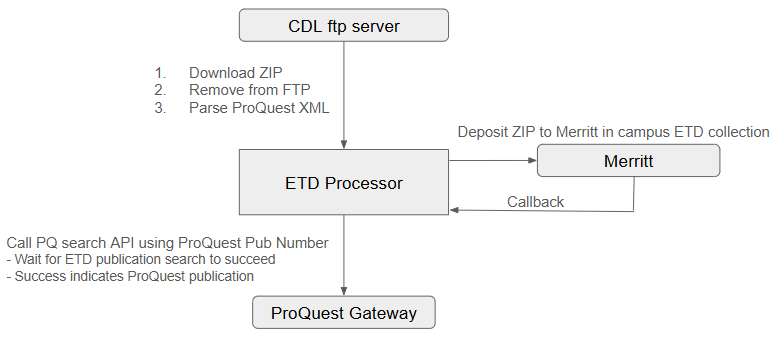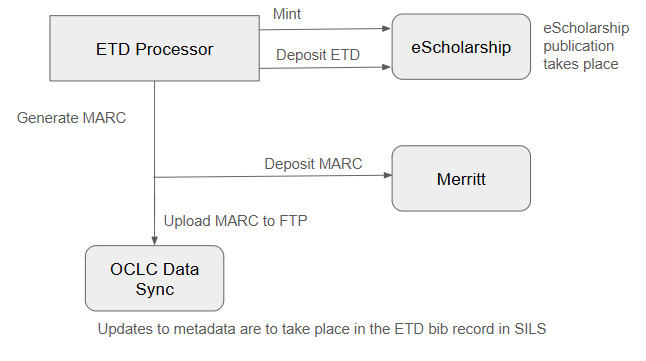UC student theses and dissertations (ETDs) are managed locally at each UC campus, but are made publicly available and preserved through the systemwide ETD service provided by the California Digital Library (CDL) at the UC Office of the President. This article describes the ETD workflow; please see the ETD FAQ for answers to common questions about ETDs.
The UC ETD Workflow
In general, several months after a student submits their thesis or dissertation to ProQuest as instructed by their campus, ProQuest programmatically delivers all associated files to the CDL ETD service for subsequent processing, including:
- Creation of catalog records for review and upload by campus librarians, to ensure discoverability in UC Library Search (UC’s systemwide library catalog);
- Submission of ETD files (PDF, supplemental files, and metadata) to eScholarship, UC's open access repository and publishing platform; and
- Deposit of all files to Merritt, the open-source digital preservation repository maintained by the University of California Curation Center (UC3) at the CDL, to ensure long term stewardship and preservation.
Embargoed ETDs have metadata available in both eScholarship and UC Library Search; the full-text file will be available in eScholarship once the embargo expires. A very small number of UC ETDs have a permanent embargo; these items will be submitted to Merritt for preservation, but because eScholarship is an open access repository, they will only be discoverable in UC Library Search.
The images below depict how ETDs are processed, from original file deposit by ProQuest to display in eScholarship and inclusion in UC Library Search.
Figure 1. ETD Pre-Publication processing
Figure 2. ETD Publication/Post-Publication Processing
Updating UC ETDs
ETDs sometimes require metadata updates, for instance:
- Correcting misspellings or other typos in names, titles, or abstracts; or
- Extending or adding an embargo.
MARC Tags and Related Metadata Values
Each campus graduate division has policies that must be followed for significant changes such as extending or adding an embargo. CDL instructs students desiring such changes to contact either their campus graduate division directly or their campus ETD contact.
At a campus level, once a student has obtained permission to modify their ETD embargo, campus catalogers can then update the ETD’s bib record in the Alma Network Zone, and it is then indexed for display in Primo (UC Library Search). “Legacy” ETDs, those submitted before [MM/DD/2025], may not be in the Network Zone, in which case CDL must make the changes (see "Legacy ETDs" below).
CDL’s ETD service receives a daily feed of changes, which are then reflected in eScholarship. A change may take 48 hours to appear, depending on when the update was made in the Alma Network Zone.
Embargo Changes
Embargo dates should never be removed from the metadata; this information is necessary for responding to legal inquiries about an ETD’s exact public availability timeframe. Clearing of an embargo should be implemented by setting the embargo expiration date to the desired embargo end date (see "Instructions for Library Catalogers" below).
Instructions for Library Catalogers
Follow the steps below to update an embargo in Alma:
- Locate the ETD’s bib record in the Network Zone and add or update the 506 field in Metadata Editor.
- Note: If an embargo is being removed, do not delete the 506 field. Instead, please update the 506 $g to the date the embargo ends.
- Embargo dates should never be removed from the metadata; this information is necessary for responding to legal inquiries about an ETD’s exact public availability timeframe.
- A publishing profile will export updates to NZ ETD records to eScholarship.
PDF and Supplemental Files
The PDF and supplemental files associated with a given ETD are publicly available in eScholarship and preserved in a campus specific ETD collection. When the primary PDF file and/or supplemental files need to be replaced, campus ETD contacts should send the files and an update request to eScholarship Support.
“Legacy” ETDs
The majority of “legacy” ETDs--i.e. those submitted before 7/12/2025--are not in the Alma Network Zone, so updates must be made by CDL. In this case, campus library staff should submit a support request to eScholarship Support specifying the desired changes and the associated Graduate Division approvals.
Updates from ProQuest
ProQuest is developing a new approach to ETD updates that is tentatively scheduled for availability sometime in 2026. Until then, changes to ETDs will need to be made in both ProQuest and within UC systems.
Questions?
Campus specific ETD questions should be sent to the campus ETD contact.
Any non-campus specific questions about the CDL ETD service or about a particular ETD should be sent to eScholarship Support.
Questions about ETD presentation in UC Library Search or UC shared cataloging conventions for ETDs should be sent to the CDL Helpline.

